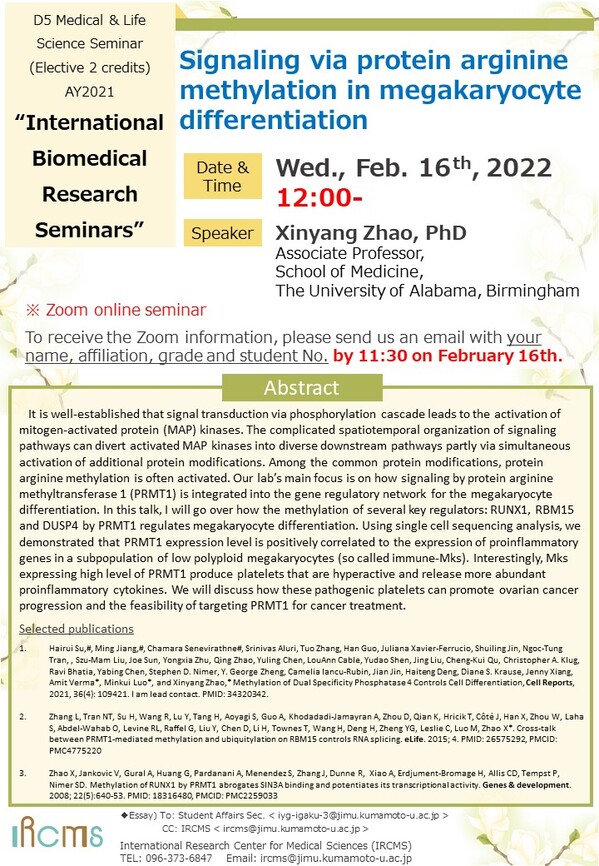- HOME
- News & Events
- [Feb. 16] D5 Medical & Life Science Seminar-Dr. Xinyang Zhao
News & Events
[Feb. 16] D5 Medical & Life Science Seminar-Dr. Xinyang Zhao
February 2 2022
The "D5 Medical & Life Science Seminar" course will be offered by International Research Center for Medical Sciences (IRCMS). It will run from April 2021 to March 2022, with lectures given by scientists who are affiliated with IRCMS or in collaboration with researchers at IRCMS. The lectures will be given once a month, in English, and by leading scientists in the relevant research field. Students will be taught: 1) how normal physiological functions are maintained in the human body; 2) how these systems become abnormal under certain pathophysiologic conditions; 3) why stem cells are important in animal development and homeostasis; 4) how stem cell-based approaches can help us understand disease mechanisms and find potential cure for diseases related to stem cell malfunction (e.g., cancer, aging).
Date : February 16, 2022 (Wednesday)
Time : 12:00 -
* Zoom online seminar
|
To receive the meeting ID / Password, please send an email to |
Speaker : Xinyang Zhao, PhD
Associate Professor,
Department of Biochemistry and Molecular Genetics,
School of Medicine,
The University of Alabama, Birmingham
Title : Signaling via protein arginine methylation in megakaryocyte differentiation
Abstract :
It is well-established that signal transduction via phosphorylation cascade leads to the activation of mitogen-activated protein (MAP) kinases. The complicated spatiotemporal organization of signaling pathways can divert activated MAP kinases into diverse downstream pathways partly via simultaneous activation of additional protein modifications. Among the common protein modifications, protein arginine methylation is often activated. Our lab's main focus is on how signaling by protein arginine methyltransferase 1 (PRMT1) is integrated into the gene regulatory network for the megakaryocyte differentiation. In this talk, I will go over how the methylation of several key regulators: RUNX1, RBM15 and DUSP4 by PRMT1 regulates megakaryocyte differentiation. Using single cell sequencing analysis, we demonstrated that PRMT1 expression level is positively correlated to the expression of proinflammatory genes in a subpopulation of low polyploid megakaryocytes (so called immune-Mks). Interestingly, Mks expressing high level of PRMT1 produce platelets that are hyperactive and release more abundant proinflammatory cytokines. We will discuss how these pathogenic platelets can promote ovarian cancer progression and the feasibility of targeting PRMT1 for cancer treatment.
Selected publications:
-
Hairui Su,#, Ming Jiang,#, Chamara Senevirathne#, Srinivas Aluri, Tuo Zhang, Han Guo, Juliana Xavier-Ferrucio, Shuiling Jin, Ngoc-Tung Tran, , Szu-Mam Liu, Joe Sun, Yongxia Zhu, Qing Zhao, Yuling Chen, LouAnn Cable, Yudao Shen, Jing Liu, Cheng-Kui Qu, Christopher A. Klug, Ravi Bhatia, Yabing Chen, Stephen D. Nimer, Y. George Zheng, Camelia Iancu-Rubin, Jian Jin, Haiteng Deng, Diane S. Krause, Jenny Xiang, Amit Verma*, Minkui Luo*, and Xinyang Zhao,* Methylation of Dual Specificity Phosphatase 4 Controls Cell Differentiation, Cell Reports, 2021, 36(4): 109421. I am lead contact. PMID: 34320342.
-
Zhang L, Tran NT, Su H, Wang R, Lu Y, Tang H, Aoyagi S, Guo A, Khodadadi-Jamayran A, Zhou D, Qian K, Hricik T, Côté J, Han X, Zhou W, Laha S, Abdel-Wahab O, Levine RL, Raffel G, Liu Y, Chen D, Li H, Townes T, Wang H, Deng H, Zheng YG, Leslie C, Luo M, Zhao X*. Cross-talk between PRMT1-mediated methylation and ubiquitylation on RBM15 controls RNA splicing. eLife. 2015; 4. PMID: 26575292, PMCID: PMC4775220
-
Zhao X, Jankovic V, Gural A, Huang G, Pardanani A, Menendez S, Zhang J, Dunne R, Xiao A, Erdjument-Bromage H, Allis CD, Tempst P, Nimer SD. Methylation of RUNX1 by PRMT1 abrogates SIN3A binding and potentiates its transcriptional activity. Genes & development. 2008; 22(5):640-53. PMID: 18316480, PMCID: PMC2259033 Shin JW#. C1 CAGE detects transcription start site and enhancer activity at single-cell resolution. Nature Communications Article number:360 (2019)
Flyer: (Click for a larger image)

